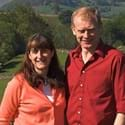David Brass and his wife, Helen, run The Lakes Free Range Egg Company (“The Lakes”) in England’s North West.
Around 70,000 free-range birds are held over two sites but most of the egg production is carried out by local farmers. The innovative system sees The Lakes provide a minimum three flock contract, and in return suppliers have to meet David’s high standards of farming practice and animal welfare.
Key areas of sustainable practice
All eggs are produced under British Egg Industry Council standards, and all farms are approved under the RSPCA’s Freedom Foods Scheme.
The business provides employment for over 60 local people, all of whom are paid at least 10% above the minimum wage.
Staff also receive training and are encouraged to undertake more duties and responsibilities, which is then reflected in their pay.
Over the last 12 months, The Lakes has put £4 million into the local economy, through wages, local contracts and general spending.
Following the devastating outbreak of foot-and-mouth disease in 2001, which badly affected traditional agricultural enterprises in the area, The Lakes has provided local farms with a profitable alternative. Fifty local family farms currently have contracts to supply free-range eggs.
The Lakes has adopted a comprehensive vaccination program for all pullets, which helps develop the birds’ natural defenses against disease.
Deworming is completed after worm sampling has identified the need to do so.
Control of red mite is also considered during the construction of bird housing, which reduces the need for chemical controls.
Native trees are planted in 20% of the birds’ range; this encourages more natural behavior and fewer welfare issues, improved economics and increased biodiversity levels.
All supplier farms have a specific biodiversity management plan created by independent advisors, the Farming and Wildlife Advisory Group. They must also be registered under the DEFRA-funded Entry Level Scheme (ELS), which encourages farmers to deliver simple yet effective environmental management plans.
The buildings used and recommended by The Lakes for laying birds are simple to construct and use the minimum of electricity once operational. They are also designed to be multipurpose, so a future change of use can be easily adopted.
The Lakes’ egg yields are consistently higher than the U.K. average.
Learn more about David Brass’ story
Explore the case study, where you’ll find extra details on how they’ve performed against the program’s good practice standards and criteria, what external research reveals about their actions and how improved sustainability benefits them.

“It is good to see our customers taking an active interest in the production systems their suppliers use to produce their raw materials and then promote best practice within their supply base. For our farming operation to be selected as an example of best practice for the McDonald’s Flagship Farms program is not only an honor personally but recognizes the strenuous efforts our whole team has made.”
“David and Helen have developed a business which is focused on animal welfare and great product quality. Their dedication and commitment to the local community and environment is admirable. They are passionate about the welfare of their birds and are committed to providing conditions which improve the well-being of the birds. David is quick to share his ideas and enthusiasm with his contract egg producers and has developed a business which is easy for farmers to set up and is ultimately profitable.”


